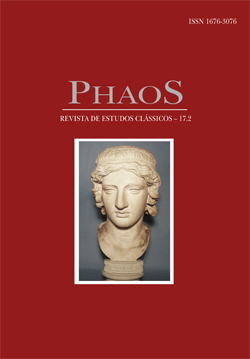O banquete poético em Geritades, de Aristófanes
Palavras-chave:
Geritades, Aristófanes, comédia, catábaseResumo
ResumoDas 35 comédias fragmentadas de Aristófanes, Geritades (408 a.C) é umas das que mais guardam informações sobre enredo, personagens e tema. Seu fragmento mais extenso (156 K-A) revela-nos que seu enredo contém uma viagem ao Hades, empreendida por poetas representantes da comédia, tragédia e ditirambo. O critério de eleição dos embaixadores parece ter sido a aparência física consonante com o mundo dos mortos: magros e de aspecto doentio, os poetas foram apelidados de haidophoítai, “visita-Hades”, metáfora para descrever uma geração de poetas que, ao invés de notáveis pelo vanguardismo, são apontados por Aristófanes como homens da decadência. Geritades certamente promoveu uma discussão sobre poesia, particularmente sobre as espécies poéticasditas “dionisíacas”. Pode-se depreender ainda, a partir de alguns de seus fragmentos,que o enredo conta com um metafórico festim poético,imagem que alia a crítica literária à cena convival. AbstractGerytades (408 BC) is one of the 35 fragmentary plays of Aristophanes that preserves the largest quantity of information about the plot, characters and theme. Its longest fragment (156 K-A) reveals that the plot contains a journey to Hades, undertaken by comic, tragic and dithyrambic poets. These poets have been chosen because of their physical appeareance in accordance with the world of the dead: skinny and sickly, they were called haidophoítai, “Hades-haunters”, a metaphor to describe a generation of poets that are pointed out as decadent, instead of noteworthy for their avant-garde art. Gerytades no doubt promoted a discusion about poetry, particularly about the so-called “dionysiac poetry”. More over, one can deduce from some of its fragments that the plot also contains a metaphorical poetic feast, an image that allies literary criticism to the convival scene.Referências
Referências Bibliográficas
ARISTÓTELES (1973). Poética. Os Pensadores IV. Tradução, comentários e índices analítico e onomástico de Eudoro de Souza. São Paulo: Editora Abril.
BILES, Z. P. (2006-2007). Aeschylus' Afterlife Reperformance by Decree in 5th C. Athens? llinois Classical Studies, vol. 31/32, pp. 206-242 . Champaign: University of Illinois Press. Stable URL: http://www.jstor.org/stable/23065317
DESMOND, W. (2008) Cynics. Stocksfield: Acumen.
DUARTE, A. S. (2000). O dono da voz e a voz do dono. A parábase na comédia de Aristófanes. São Paulo, Humanitas.
FARMER, M. C. (2017). Tragedy on the Comic Stage. Nova Iorque: Oxford University Press.
GAZZINELLI, G. G. (2014). A vida de Sátiro de Eurípides. Classica – Revista Brasileira de Estudos Clássicos, vol. 27, n.2. Classica On Line: e-ISSN 2176-6436 - Versão eletrônica.
GIL, L. (1989). El Aristófanes perdido. Cuadernos de Filología Clásica, ed. 22-39-106. Madri: Ed. Universidad Complutense.
HENDERSON, J. (2007). Aristophanes V – Fragments. Edited and translated by Jeffrey Henderson. Loeb Classical Library. Cambridge, MA: Harvard University Press.
HENDERSON, J. (2002). Aristophanes V – Frogs, Assemblywoman, Wealth. Edited and translated by Jeffrey Henderson. Loeb Classical Library. Cambridge, MA: Harvard University Press.
KASSEL e AUSTIN. (1984). Poetae Comici Graeci. Vol. 3: Aristophanes – Testimonia et Fragmenta. Berlim, Nova Iorque: De Gruyter.
LUKI NOVICH, A. (1999). The Play of Reflections between Literary Form and the
Sympotic Theme in the Deipnosophistae of Athenaeus. In: Sympotika: a Symposium on the Symposion. Edited by Oswyn Murray. Oxford: Clarendon Press.
PEARSON, L. (1963). Perfume on Lentils. Transactions and Proceedings of the American Philological Association, vol. 94, pp. 176-184. The Johns Hopkins University Press. Stable URL: http://www.jstor.org/stable/283646 . Accessed: 08-06-2017
PEPPLER, C. W. (1918). Comic Terminations in Aristophanes. The American Journal of Philology, vol. 39, N. 2. p. 173-183. Baltimore: The Johns Hopkins University Press. Stable URL: http://www.jstor.org/stable/289530
PIETROBELLI, A. (2010). Commenter Galien et Hippocrate à la Renaissance ou comment Brasavola met à mal le régime grec. Renaissance and Reformation / Renaissance et Réforme, vol. 33, No. 3, Special issue / Numéro spécial: De Fabrica Artis Medicinae : Les redéfinitions de la médecine à la Renaissance, pp. 99-140 Published by: Renaissance and Reformation / Renaissance et Réforme. Stable URL: http://www.jstor.org/stable/43446212 Accessed: 11-07-2017
SCHIEFSKY, M. J. (2005). Hippocrates. On Ancient Medicine. London: Brill.
STOREY; ALLAN. (2005). A Guide to Ancient Greek Drama. Maelden, Oxford, Carlton: Blackwell Publishing.
TAPLIN, O. (1983). Tragedy and Trygedy. The Classical Quarterly, vol. 33, No. 2. Cambridge University Press on behalf of The Classical Association . Stable URL: http://www.jstor.org/stable/638776 . Acessado em 10/10/2016, 18:04 UTC.
WRIGHT, M. (2012). The Comedian as Critic – Greek Old Comedy as Poetics. London: Bristol Classics Press.
YOUNG, A. M. (1933). The Frogs of Aristophanes as a type of play. The Classical Journal, vol. 29, Nº1, pp. 23-32. The Classical Association of the Middle West and South, Inc. (CAMWS). Stable URL: http://www.jstor.org/stable/3289842
Downloads
Publicado
Edição
Seção
Licença
Ao se submeterem textos para a PhaoS, seus autores devem estar cientes de que, se aprovados para publicação, a revista terá sobre eles todos os direitos autorais pertinentes. Originais não serão devolvidos.

